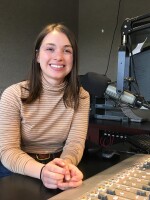The Park City Council debated one of its critical community priorities, transportation, on Thursday at their annual retreat. They discussed long-range plans for transit and parking. KPCW’s Emily Means has more.
Park City Transportation Manager Alfred Knotts announced a goal of reducing trips by 25% by 2030, to 15 million down from 20 million in 2018. Achieving that objective would bring traffic levels back to what residents saw in 2003. Councilmember Nann Worel said people would be shocked to know the number of trips that happen in and out of town.
"I think that that, then, can easily lead into the conversation about individual responsibility, because at the end of the day, that’s what we’re talking about it," Worel said. "We’re asking people what role do you play in our traffic problems. Instead of sitting there complaining about it, look inward and say, 'how am I part of those 20 million car trips, and what can I do with my behavior,' because I think individual responsibility has got to be part of this conversation."
Knotts presented several policies to the council to assist in moving the city towards that goal, including prioritizing public transit and active transit, such as walking and cycling, over single-user car trips; and engaging employers in supporting their employees in using transit. All the policy suggestions were received favorably by council.
Another piece of the two-and-a-half-hour conversation centered around parking management and how the recently introduced paid parking system has affected Old Town. The councilmembers agreed that they’re committed to paid parking, and Mayor Andy Beerman noted that, generally, business on Main Street has grown almost 10% after the implementation of paid parking. He also said it’s time to introduce more variables for paid parking—like changing rates during specific seasons—and to address Old Town residents’ transportation needs, something that was originally discussed when the parking management system was initiated.
"We had a couple of things. We were going to implement paid parking, and it was going to be a dynamic system, like Tim was talking about, and I think we ran into technology hurdles there that made it a lot more static than we hoped," Beerman said. "We also were going to put circulators in place, and those circulators are what were going to service our residents, so they weren’t feeling left out. They were going to bring our workforce in as we needed, which we’ve sort of backfilled with the Homestake lot, but we were also going to have a dynamic transit system that would get people on the system and into Old Town. We bailed on that aspect."
The Council also supported the idea of increasing restrictions for non-residents parking in residential areas as well as providing more permits to residents.



